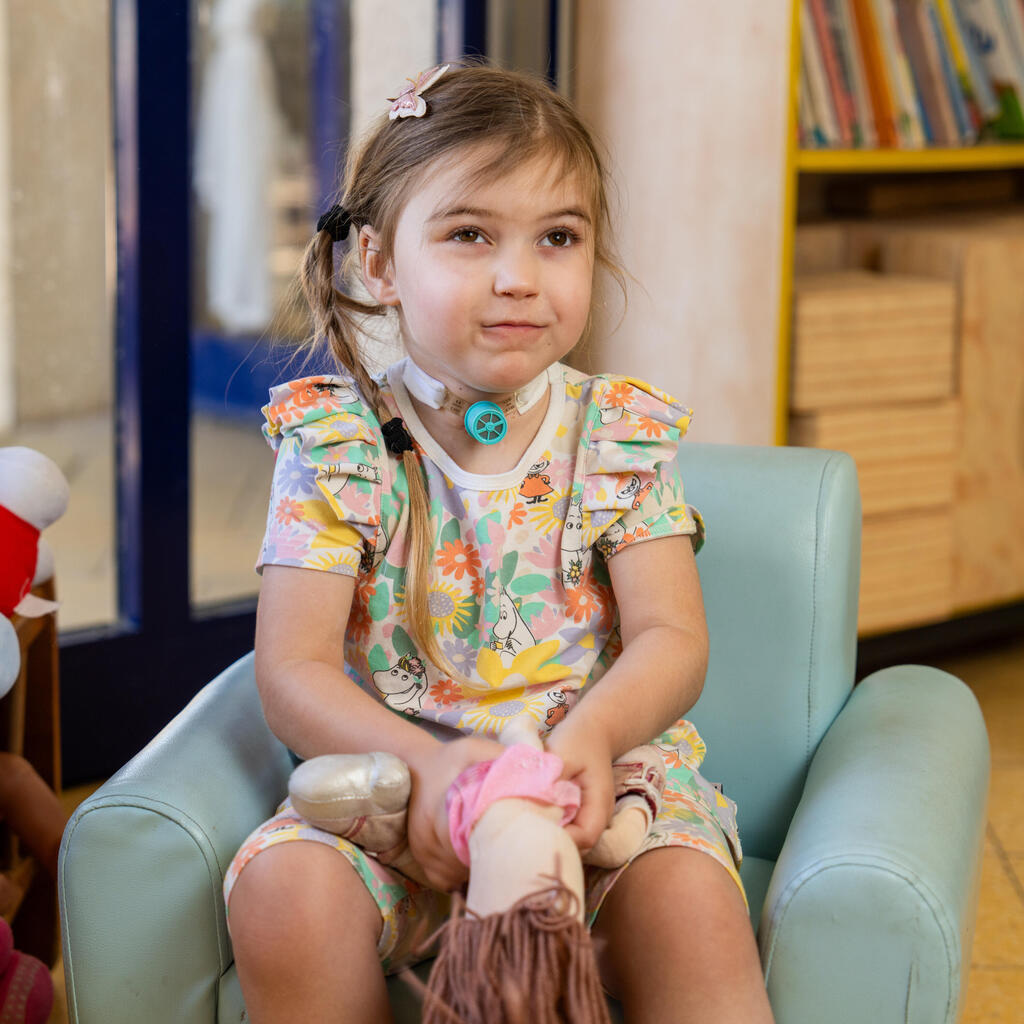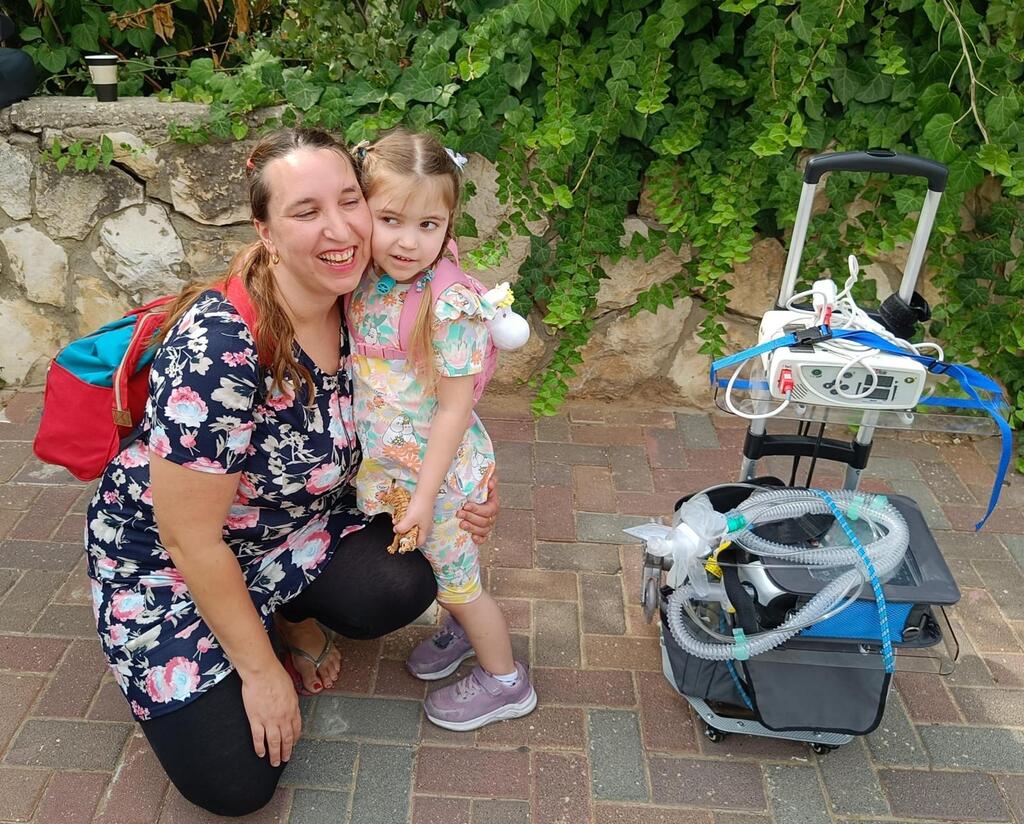Getting your Trinity Audio player ready...
When Sarah arrived at Alyn Rehabilitation Hospital a year ago, it was hard to believe she'd ever reach this moment—starting a new school year in kindergarten. But she did. Four-year-old Sarah had undergone brain surgery to remove a tumor and additional abdominal surgeries due to complications. She couldn’t walk or breathe on her own.
After spending the last year in hospitals, she recently began attending a rehabilitative kindergarten, accompanied by a portable ventilator. "It’s unbelievable what she’s been through," her mother, Abigail, said.
3 View gallery


Sarah getting released from the rehabilitation hospital
(Photo: Alyn Rehabilitation Hospital)
Sarah was born healthy and developed normally until she was two and a half. "She walked, talked, and was an active, social child," Abigail recalled. "Then one day, I noticed her walking was a bit clumsy, she was falling more often, and within days, she started vomiting and seemed tired and tearful."
When Sarah began to lose her balance, her parents rushed her to a pediatrician, who referred them to both an eye doctor and a neurologist. "Her vision test was fine, but the neurologist immediately suspected something was wrong and sent her for an MRI." The scan was done in the evening, and the results were read urgently. By the next morning, Sarah was in surgery. "They found a tumor attached to her brainstem, which was immediately life-threatening, so she had to have emergency surgery. We barely had time to process the news before we found ourselves anxiously waiting outside the operating room at Shaare Zedek Medical Center."
The surgery lasted over eight hours. When it was over, the doctors told Sarah’s worried parents that she was moving her limbs. She was transferred, still sedated and on a ventilator, to the pediatric intensive care unit. "From that critical moment, where we were expecting a long recovery, everything that could go wrong, did," said Abigail. "I don’t know exactly how it happened, but a complication led to a perforation in her esophagus, which resulted in four abdominal surgeries in a row at Hadassah Medical Center, where she was transferred for further care."
Abigail explained that Sarah developed a fungal infection and sepsis, a life-threatening response to a severe infection. "The doctors at Hadassah diagnosed necrosis in her intestines, leading to the removal of a large portion." Because of this, Sarah was fitted with a stoma (an artificial opening to allow waste to exit the body) and a PEG tube (a feeding tube placed in her abdomen to provide nutrition when swallowing is impaired).
"She had recurring bouts of pneumonia that required intensive care," Abigail said. "More than once, the doctors had to save her life. Who would have believed that my healthy, energetic little girl would leave the hospital at age three on a ventilator, with a feeding tube and a stoma?"
A year ago, Sarah was transferred to Alyn Hospital, a specialized rehabilitation center for children and teens. "She arrived here at age three, bedridden," said Dr. Eliezer Barry, Alyn’s deputy director and head of the respiratory rehabilitation department. "The benign tumors in her brain and spine had damaged her respiratory center, meaning she couldn’t breathe on her own. She can breathe independently at times but still requires occasional external respiratory support." Throughout her rehabilitation, one of her parents was always by her side. "We also have a nine-year-old son at home, and we had to care for him too," Abigail noted. "Thankfully, we had volunteers who helped during this challenging time."
When Sarah first arrived at Alyn, she met with Meira Skuler, the head of physiotherapy in the respiratory department, for an initial assessment. "When I saw her, she was in bed, non-functional, and very withdrawn from the staff. The first step was building her trust," Skuler explained. Sarah’s long hospital stay, the painful blood tests, and various medical procedures had left her viewing caregivers as part of a group that caused her pain.
"Our first bridge to her was creating moments of joy in her mother’s presence," Skuler said. "I would sometimes do silly things to make her laugh. Once I eased her fear of people in uniforms, I started incorporating physical exercises through play while she was still lying down. For example, when we played card games, I would give her a card and ask her to pass it to her mom standing on the other side of the room."
Skuler added that they worked on transitions, like helping Sarah move from lying down to sitting, first with support and then without. Eventually, they moved her to the floor. As her motor skills improved, they increased the challenges in her rehabilitation. "Based on her progress, we kept pushing her forward, always monitoring her breathing with each new position."
The next step was getting Sarah into a standing frame that supported her hips and back. As she became more stable, she transitioned to a more advanced frame that allowed her to use her hands. "Standing helped her regain confidence in her own strength. Being able to move around gave her more freedom and helped her bond with the staff," Skuler said.
From the beginning of her rehabilitation, the team involved Sarah’s parents in every step, knowing they would need to perform medical tasks at home. "At first, I was terrified of draining her phlegm or connecting her to different machines," Abigail admitted. "But thanks to the instruction, patience, and support we received, I was able to set up a mini-hospital at home with a ventilator, suction machine, catheters, drainage tubes, feeding devices, and more." Abigail also expressed gratitude to her supportive Messianic community. "I’m Jewish, and I made aliyah from Finland in 2010. My husband, who is Christian, immigrated three years later. We built a family and are part of a community with members from different faiths," she explained.
At Sarah’s discharge, the medical team, who had supported her throughout the past year, were emotional. "She achieved things we didn’t think were possible. Seeing her walk warmed our hearts. She’s such a captivating child, but the one thing that saddens her is not being able to eat 'like the other kids in kindergarten.'"



